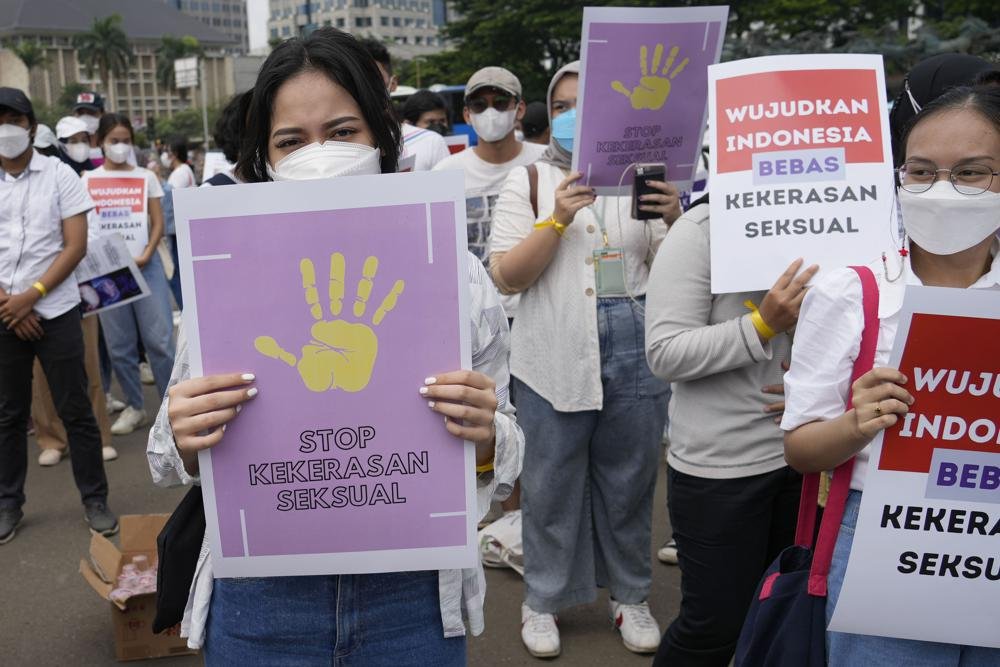JAKARTA, April 12 (AP): Indonesia’s Parliament approved a far-reaching law on Tuesday that sets punishments for sexual violence after being spurred into action by a recent case in which an Islamic boarding school principal raped and impregnated several students.
The legislation had languished for years amid arguments that it contravenes religious and cultural values in the world’s biggest Muslim-majority nation.
The law recognizes men and children can be victims of sexual violence. Indonesia’s Criminal Code, a legacy of the Dutch colonial era recognizes only rape and lewd crimes committed by men against women and doesn’t have provisions for restitution or other remedies for victims and survivors.
Nine forms of sexual violence are recognized in the law: physical and nonphysical sexual harassment, sexual torture, forced contraception, forced sterilization, forced marriage, sexual slavery, sexual exploitation and cyber sexual harassment.
In addition to acknowledging sexual violence as punishable criminal acts, the law has provisions for protection and recovery for the victims.
Of the House of Representative’s nine political parties, only the conservative Muslim-based Prosperous Justice Party, known as PKS, rejected the bill because they wanted it to prohibit extramarital sex and homosexual relations.
“Our rejection is part of our struggle to fight for the prohibition and punishment of perpetrators of adultery and sexual deviations which are ultimately not included in the bill,” said Al Muzzamil Yusuf, a legislator from PKS.
The law was passed a week after an Indonesian high court sentenced an Islamic boarding school principal to death for raping at least 13 students over five years and impregnating some of them. Several girls were 11 and 14 years old and were raped over several years, drawing a public outcry over why he wasn’t caught earlier.
President Joko Widodo in January appealed to the House to speed up deliberation on the sexual violence bill after it had languished in the legislature since 2016 as critics lambasted lawmakers for having “no sense of crisis.”
“The protection of sexual violence victims should be our common concern which should be urgently addressed,” Widodo said.
Under the new law, perpetrators of electronic-based sexual violence could face up to 4 years’ imprisonment and a 200 million rupiah ($13,920) fine, and up to 6 years and a 300 million rupiah ($20,880) if it was carried out with the aim of extorting, coercing, and deceiving victims. Perpetrators of sexual exploitation face up to 15 years in prison and a fine of 1 billion rupiah ($69,600).
The law also mandates that a trust fund and services to help victims recover be established and regulated by the government.
The bill was initiated by the National Commission on Violence Against Women in 2012. Calls for it to be fast-tracked followed the shocking gang rape and murder of a 13-year-old schoolgirl by 14 drunken men in Bengkulu in 2016. It soon stalled due to resistance from PKS and Islamic groups.
The latest draft won majority support when provisions on rape and coerced abortions were removed from to avoid overlapping with proposals to amend the Criminal Code.
Activists involved in protecting victims of sexual violence hailed the new law as a milestone.
“We highly appreciate the tireless efforts of the government and legislators in providing protection for sexual violence victims by passing this long-awaited law,” said Siti Mazuma, director of the women’s legal aid foundation LBH Apik.
Government data show at least 797 children became victims of sexual violence in January alone. The total number of reported child victims reached 8,730 in 2021, rising 25% from 2020. As of 2020, there were 45,069 recorded cases of sexual violence against girls and women since the drafting of the bill in 2012.
- Advertisement -
- Advertisement -
- Advertisement -
- Advertisement -



